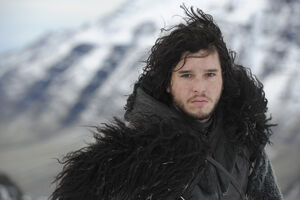
Jon Snow, a bastard of House Stark.
- Jon Snow: "What's my name?"
- Samwell Tarly: "Jon Snow."
- Jon Snow: "And why is my surname 'Snow'?"
- Samwell Tarly: "...Because you're a bastard from the North."
- — Jon Snow and Samwell Tarly[src]
The term bastard refers to anyone born out of wedlock. In the Seven Kingdoms there is considerable social stigma attached to being a bastard. The Faith of the Seven and that of the Old Gods of the Forest have rules against bastardy.
Legal status
Bastards are not allowed to inherit their father's lands or titles, and have no claims to the privileges of their father's House. It is up to their father on how to raise or treat them: at worst they are unacknowledged and ignored, though they may fare better and be discreetly sent funds to ensure their well-being. At best, a lord will acknowledge his bastard children (allowing them to take on one of the special bastard surnames), but send them away to one of his distant castles to be raised away from his lawful family. For bastard children to be raised by their father in his own castle alongside his trueborn children is considered extremely unusual.
There is no outright law punishing noble men or women for having bastard children, instead it is considered a social and religious disgrace.
It is possible for the king to legitimize a lord's bastard children, though this special dispensation is difficult to acquire and infrequently happens. It will usually only be granted if a lord has no other legitimate children (or no male children) to carry on the name of his house. However, the social stigma is not automatically removed after the bastard is formally legitimized.
Terminology
The stigma of illegitimacy is so great, that all bastards born to noble Houses in Westeros have to identify themselves through a specific surname marking them as a bastard, which varies by region:
- Flowers: The Reach
- Hill: The Westerlands
- Pyke: Iron Islands
- Rivers: The Riverlands
- Sand: Dorne
- Snow: The North
- Stone: The Vale of Arryn
- Storm: The Stormlands
- Waters: The Crownlands
However, this system does not apply to the bastards of smallfolk: at least one parent (usually, but not always, the father) has to be a member of a noble House. If both the father and mother are commoners, the child cannot use the special surname.
The low-born commoners of Westeros do not actually use surnames at all. Therefore, possessing a bastard surname is simultaneously a mark of distinction and badge of shame. Anyone who encounters someone with a bastard surname will immediately know that they are not simply a bastard, but the bastard child of a noble.

Gendry, as an unacknowledged bastard of Robert Baratheon, cannot use the surname "Waters".
Bastards only use the special surnames if they have been openly acknowledged by their noble-born parent. In such cases, their noble parent will usually try to make sure that they are well cared for, or send money for their support, but it is extremely unusual for a noble to raise their bastard child in their own household.
There is no official distinction between bastards who have one noble-born parent, and those whose parents are both noble-born. In practice, however, a nobleman would be much more likely to acknowledge a bastard child born to a noble lady, than he would a child born to a commoner.
Bastard surnames are dependent on the region a child was born in, i.e. where the mother is from, not where the father is from. For example, a noble lord from the Stormlands could father one bastard child in the Vale, and another in the Riverlands, but neither would use the surname "Storm": the first bastard would use the surname "Stone", and the second would use the surname "Rivers." It is extremely unusual for a bastard to know who his nobleman father is, but not his mother. Therefore Jon Snow's situation is additionally unusual, not just because he actually lives with his nobleman father, but because he probably wasn't even born in the North. Eddard Stark brought him back to Winterfell as an infant after fighting in the south during Robert's Rebellion, but refused to say who his mother was or where she came from. As a result of the mystery surrounding his mother's identity, Jon ended up using the surname "Snow" by default.
Bastard children of a noble lord may be referred to politely as "natural children", though the less polite term "baseborn" is more commonly used, and they are often bluntly and rudely referred to as simply "bastard." In contrast, a noble lord's children with his lawfully married wife are termed "trueborn." Thus when Lord Eddard Stark discovers that none of Cersei Lannister's children were fathered by her husband King Robert Baratheon, he says that King Robert "has no trueborn sons," even though he knows that Robert has several "baseborn," bastard children.[1]
Known bastards
The North
- Jon Snow, the bastard son of Lord Eddard Stark, allegedly with a serving girl named Wylla. Sarcastically called "Lord Snow".
- Ramsay Snow, the bastard son of Lord Roose Bolton of the Dreadfort.
The Iron Islands
- Cotter Pyke, commander of Eastwatch, one of the three castles manned by the Night's Watch.
The Riverlands
- Ser Walder Rivers, a bastard son of Lord Walder Frey and a milkmaid.
The Crownlands
- {Daemon Blackfyre}, legitimized bastard son of King Aegon IV Targaryen, who lived over a hundred years before Robert's Rebellion.
The Reach
- {Jafer Flowers}, a ranger of the Night's Watch who accompanied Benjen Stark on a mission, was killed and returned as a wight before being destroyed.
Unacknowledged bastards
- Gendry, a blacksmith's apprentice in King's Landing, one of several bastard sons of King Robert Baratheon. Because Robert never acknowledged Gendry, he does not use the bastard surname "Waters."
- {Barra}, another of King Robert's bastards. Killed by Janos Slynt during the purge of Robert's bastards.
- King Joffrey Baratheon: Although generally believed to be the son of Robert Baratheon and Cersei Lannister, he is actually the son of Jaime Lannister and Cersei, making him not only a bastard, but a bastard born of incest.
- Princess Myrcella Baratheon: Jaime and Cersei's second child.
- Prince Tommen Baratheon: Jaime and Cersei's third child.
In the books
In the A Song of Ice and Fire novels, the status of being a bastard is a considerable social disgrace amongst the nobility, though less so amongst the smallfolk. However, whilst bastards are disadvantaged, they still have means to climb the social ladder. They may win honor and glory in battle and be knighted. If they do great deeds in service to the king or a noble lord, they can even receive a bill of legitimacy, allowing them to take their father's surname and formally join his House, or to take a new surname and found a new House (some bastards take new names altogether, like "Blackfyre", while others add a prefix to their bastard name, such as "Longwaters"). For example, House Baratheon was founded by the legitimized bastard half-brother of King Aegon the Conqueror.
However, while bastards stand outside the lines of succession and inheritance, there are still exceptions which have caused immense problems. King Aegon IV Targaryen legitmized three of his bastard sons and one of his bastard daughters on his deathbed. His eldest bastard son, Daemon Blackfyre, later claimed the Iron Throne and led a bloody civil war known as the First Blackfyre Rebellion. His sons and descendants launched four more attempts to take the Iron Throne before their final claimant, Maelys the Monstrous, was slain by Ser Barristan Selmy during the War of the Ninepenny Kings. This is sometimes used as an example of what happens if a bastard is treated too well and given too much power and legitimacy.
Fans sometimes derisively assume that "Joffrey Baratheon" should really be called "Joffrey Lannister," because of his status as the bastard offspring of the incestuous relationship between Cersei Lannister and Jaime Lannister, and not the son of King Robert Baratheon at all. This is actually in error, as according to the customs of bastardy, Joffrey doesn't even have the right to use the surname "Lannister". As Jaime's bastard son, given birth to by a woman from the Westerlands (Cersei), Joffrey would have to use the bastard surname for the Westerlands: "Joffrey Hill". There's also the possibility that he might be called "Joffrey Waters" given that both Jaime and Cersei had been living in the Crownlands for many years, and Joffrey lived his whole life there. All of this, of course, would only happen if Jaime were to openly acknowledge Joffrey as his son, which is an impossibility given the disastrous political fallout this would create. Further, as the product of not merely bastardy, but incest, the Faith of the Seven would want to outright kill Joffrey as an abomination before the gods if his actual parentage were ever revealed. Therefore from a strict legal standpoint, given that Jaime will never acknowledge his children with Cersei, Joffrey has no right to any surname, and should properly just be called "Joffrey" as if he were a lowborn commoner.
